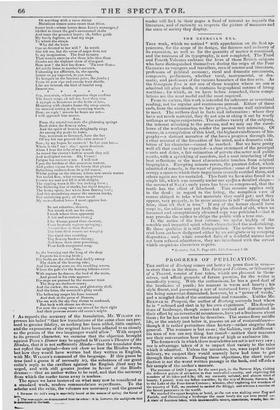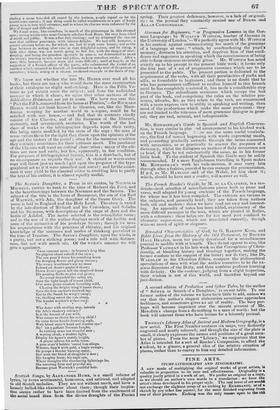PROGRESS OF PUBLICATION.
THE author of lies tang comes out better in prose than in verse— in story than in the drama. His Facts and Fictions, or Gleanings of a Tourist, consist of four tales, which are pleasant in them- selves, and afford grounds of future promise, for the writer is manifestly young. With the enthusiasm, he has a good deal of the headiness of youth; his manlier is warm and hearty ; his style fluent, and possessing a sort of untutored force; these quali- ties being somewhat diminished, however, by a "power of words,' and a mingled dash of the sentimental and romantic. Unlike Mr. BULWER in Pompeii, the author of Rostang succeeds best where he is " cabined and shut in by his own experience." His descrip- tions of landscape, though somes hat overlaid and diminished in their effect by an inventorial minuteness, have yet a freshness about them; for he has seen what he describes. The scenes from middle life, or the society just below it, possess an air of yraisemblance- though it is rather portraiture than history—rather singular than general. The romance is but so-so; the fashion, very indifferent - his men of ton are any thing but tonish—neither their manners nor their conversation bear the stamp of' high or exclusive life.
The framework in which these nouvelettes are set is not very new ; nor is advantage taken of it to impart that variety to the tales which it admitted. Unless the narrators, too, were rapid in their delivery, we suspect they would scarcely have had time to get through their stories. Passing these objections, the short intro- duction is not the worst written passage in the book, and affords a fair sample of the author's manner.
The summer of 1829 I spent, for the most part, in the Bernese Alps, visiting the different points of attraction in that unrivalled country, and exploring the wonders of its lakes and fells; till, my curiosity satiated, and almost tired of beauty, I passed, with my fellow-traveller, by tile way of Brientz, Sarnen, &c. to the Lake of the Four-forest Cantons; whence, after exploring the wonders of the country of Tell, we resolved to ascend the lidaiggi, and witness a sunrise on the fairest panorama in the world. We reached the upper hospice, or hotel, as the sun was sinking over Zug and Zurich, and illuminating a landscape the moat lovely the eye eyes rested oa. A view of fourteen lakes, with innumerable ziwirss mountains, wends, &c. •in-
eluding a scene bout:tied all round by the horizon, amply repaid us for the troublesome ascent ; if any thing could be called troublesome to a pair of hardy young men in love with romance, and to whom its charms were enhanced by the idea of danger and difficulty.
We found many, like ourselves, in search of the picturesque in this elevated spot ; amm:g whom were some German scholars from Bono, the very bean ideal of mirth and jollity. It was a fine July evening; and we witnessed the sun-set over that sublime paumatna, with intense delight. We had still, however, a greater pleasure before us, for which we had to wait some hours ; and as the time between its setting after nine at that delightful season, and its rising, a little after three, was not worth going to bed for, with the danger of over- sleeping, and losing the grandest spectacle in name, we determined to await the tising; trusting to wit, wine and jollity, to keep ourselves awake. After a time, this, however, became more and more difficult ; until at length, at the suggestion of a French officer of the party, who volunteered the recital of an incident which occurred to himself, all determined to mike trial of the powers of narrative; which, acting as a charm, awakened example to the dawn of day.



























 Previous page
Previous page